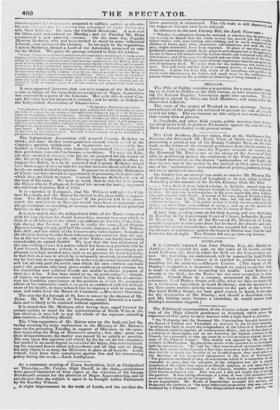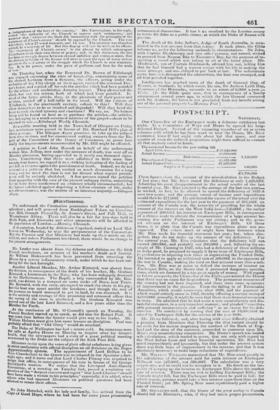The Edinburgh correspondent of the Courier relates some proceed ings
of the High Church gentlemen in Scotland, which prove the eagerness of that party to carry matters with a high hand at present-
" On Wednesday last, the Reverend Mr. Cunningham brought forward is the Synod of Lothian and Tweeddele an overture to the General Assembly. ' praying that body to assert the independence of the Church of Scodusezad her inherent right to regulate all ecclesiastical affairs ; and to declare that it is a violation of those rights, and an act deserving the highest censures of the Church, for a presentee to take any steps by a civil process to thwart the deci- sions of the Church Courts.' This motion was opposed by Mr. Cook, the minister of Haddington. Ile placed the merits of the question in an irrcfragable
light by ore sentence. If,' said he, ' they were resolved on complete leder! Bence, they might abate themselves free from connexion with the State; kat they wished to retain the benefits of an Establishment, they must submit to, the decision. of the recognized interpreters of the Acts of Parliament. ' The preachers are hound to obey all enactments which it is competent for the Assembly to pass ; but the intention of the obligation was not to deprot preachers of the rights they enjoyed as British subjects, to call upun them to yield obedience to the enactments of the Church, whether recognized by mhe
Civil Courts as legal or nut. This was not a fair and manly way of meeting the question. It was taking advantage of a body of men (the preachers) who were not there to speak for themselves.' Mr. Cook moved that the overture be not transmitted. Mr. Booth of Innerleithen seconded this motion ; and
designated the overture 'the most infatuated proposition that was CVer
tertained by a Church Court.' The independence sought for,' said he, ',iv
al independence of the laws of the country.' Mr. Cughato. in his reply, e,,,,bed *the authority of the Church to repress such sentiments;' and asssertcd that whatever the State did ioconsiment with the principles of the lup ry of Christ's crown' should be opposed by the Church. The site teas etank"en; when "7 voted transmit, and 14 not. The overture was therefore carried, by a majority of 13. But this display will nut be witlodit its effects. The 'supremacy of Christ's crown' is the phrase by which extravagant Churchmen cloak their own thirst of power ; and, in this discussion, the limb has been so ,tivrgly drawn between clerical ambition and common sense, that he division 1,vour a the former will serve to open the eyes of many serious bet • • to the teal nature of the struggle which the Church is now maintain. fte41:ult is fur power, under the guise of godliness and love fur the souls
of ran.'
On Thursday last, when the Reverend Dr. Brown of Edinburgh was engaged exercising the rites of hospitality, entertaining some of his clerical brethren from a distance, the (Avers, acting under the authority of the City clergy or their agent, sleeted the reverend Due. tore house, and carried off for sale the articles which had been poinded for the odious and unchristian Annuity rity impost. They abstracted the clock, but not the mirror, both of which had been poinded. Iu stead of the latter amide, they, in the plenitude of their power and wisdom, carried off a hall-table in its stead. Will the citizens of Edinburgh, in the nineteenth century, submit to this ? Will they allow themselves to be so insulted add degraded ? Will they bend the knee to such clerical tyranny and exactions ? We my, no. No human being will be found so base as to purchase the articles—the articles, too, belonging to a much-esteemed minister of the gospel—about to be exeosed to sale.—Edinburgh Weekly Chronicle.
At a public meeting held in the Town-hall of Glasgow on Friday last, resolutions were passed in favour of Mr. Rowland Hill's plan of cheap postage. The Glasgow Argus promises to take up the subject from time to time, and has commenced making extracts from the Re- port of the Committee of the house of Commons, to prove how easily the improvements recommended by Mr. Hill might be effected.
A petition to Lord John Russell on behalf of the unfortunate woman Mrs. Jeffrey, now under the sentence of death, was sent off on Monday afternoon, having appended to it nearly one thousand signa- tures. Considering that these were adhibited to little more than twenty-four hours, we regard it as a striking indication of the feeling of our fellow citizens against the punishment of death. Indeed, we do not remember a petition that but excited so much discussion for a long time; and we trust the time is not fur distant when capital punish. 'rent will be entirely abolished. A few persons signed the petition from sympathy with the case of the present unhappy victim, conceiving her to have been condemned on evidence wholly circumstantial ; but the horror exhibited against depriving a fellow mature of life, under any circumstances, was the motive of an immense majority.—Glasgow Argus.



























 Previous page
Previous page